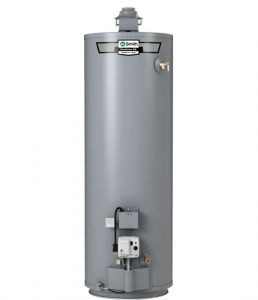 Picture this: You turn on the faucet or shower, and suddenly the hot water is way too hot, much hotter than you expected. What a horrible feeling! And excessively hot water is not only uncomfortable, it can actually scald and burn the skin.
Picture this: You turn on the faucet or shower, and suddenly the hot water is way too hot, much hotter than you expected. What a horrible feeling! And excessively hot water is not only uncomfortable, it can actually scald and burn the skin.
Your water heater is an indispensable appliance, ensuring a ready supply of hot water for your daily life. Overly hot water is not only uncomfortable, but potentially hazardous as well. There are several underlying reasons why a gas or electric water heater might produce overly hot water, such as:
- Temperature Set Too High
- Faulty Thermostat
- Clogged Pressure Relief Valve
- Mineral Build Up
- Malfunctioning Heater Element
If your water is too hot, it might be a simple fix, but there are plenty of more complicated reasons why you have extremely hot water. Will your water heater stop working? Is there a solution besides buying a new water heater? Find the answers to these hot water heater questions below.
1. Temperature Set Too High
Check whether someone has tweaked the water heater thermostat to an extra-high setting. If so, lower the temperature adjustment dial.
Ideally, the water heater temperature should not be lukewarm — it must be hot enough to protect against the growth of Legionella and other dangerous bacteria. On the other hand, too high heat wastes energy and may increase the risk of hot water scalds.
Health Services Canada recommends setting your water heater to 49° Celsius (120° Fahrenheit). They also advocate installing an anti-scald mixing valve, as well as anti-scald devices for faucets.
Flush Your Water Heater!
You can take action to prevent mineral build-up by flushing your water heater once every year. This means draining the water heater somewhat, then flushing with clean water to remove any sediment.
CAUTION: Be sure to switch off the cold water supply and the power. Allow the hot water in the tank to cool before flushing. Use a garden hose to direct water flow to a safe location, like your back lawn or a laundry sink.
DIY water heater flushing is a tedious, messy chore. If you’d prefer to save some time and hassle, we at Hot Water Ottawa will be glad to take care of your water heater maintenance for you.
2. Faulty Thermostat
Are you without hot water at home? The culprit could be a broken water heater thermostat (or two — water heater thermostats come in pairs). Your thermostat works by regulating the water heater on-off cycles. Damage to the thermostat could result in an uninterrupted heating cycle, producing that painfully hot water.
Test If It’s Broken
Are you an amateur electrician? Try this do-it-yourself test to see if your thermostat is broken:
- Turn off the power at your electrical panel.
- Unscrew upper and lower access covers.
- Confirm that the power supply is off using a multimeter.
- Take a photo for reference.
- Unscrew the wires from each of the terminals.
- Set your multimeter to the lowest ohms of resistance. Then check the right side, left side, and element terminals, both upper and lower, to see whether any of these points is bad.
- Replace the thermostat if necessary.
- Refer to your photo to reconnect the wires.
If you’re not really into DIY — or you don’t happen to own a multimeter — ask us to give you a hand.
Whichever you choose, keep in mind that thermostat replacement is a relatively simple, affordable water heater repair.
3. Clogged Pressure Relief Valve
The pressure relief valve (also called “temperature and pressure relief,” or “T & P”) is an essential component of your hot water heater. Positioned on the side or top of the tank, it releases steam in case of overheating.
When the pressure relief valve is clogged, steam will continue to build-up to the point where your water heater could explode!
BEWARE: Signs of a T & P valve malfunction include hot water that is much too hot or boiling sounds from the tank. Turn off power to your hot water tank immediately and call for professional repair.
4. Mineral Build-Up
Unlike neighbourhoods connected to the Ottawa central water supply, Greely, Richmond, and Carp have tap water that contains large amounts of dissolved calcium and magnesium. Although these minerals are harmless to human health, they do tend to leave deposits on the bottom of your water heater tank. A telltale sign is when you start hearing popping sounds from your water heater or when you’re experiencing hot water has low water pressure.
Left untreated, the mineral buildup will continue to grow and harden, blocking the heating element and causing the tank to overheat. And voila! You have hot water that’s much hotter than you’d like. PS. You also have extra wear and tear on your water tank that may shorten its service life.
Regular maintenance, including flushing the tank to remove sediment, is essential to prevent this issue. Get in touch with Hot Water Ottawa for a technician who will perform this task safely.
5. Malfunctioning Heater Element
If your water is too hot, it might be due to a faulty heater element. The heating element is responsible for heating the water in the tank. Over time, the heating elements in your gas or electric water heaters may experience wear and tear due to constant exposure to heat and water. A faulty heater element might not be able to regulate the temperature properly, leading to water that’s way too hot.
Repairing or replacing a heating element should be done by the pros. A technician will need to assess your water heater if the heating element begins to show signs of damage or wear. Heating elements come in different types and wattages, so it’s important to have a professional to ensure that the replacement element is compatible with your specific hot water heater.
We’re The Hot Water Experts
Hot Water Ottawa offers complete water heater services. Turn to us for professional hot water heater maintenance, repair, installation, or rental in the Ottawa area.
Hot water is our specialty, and we’re great at what we do! If you’re experiencing unexpectedly hot water, give us a call. We’ll get your house’s supply to the desired water temperature and correct any issues along the way.
